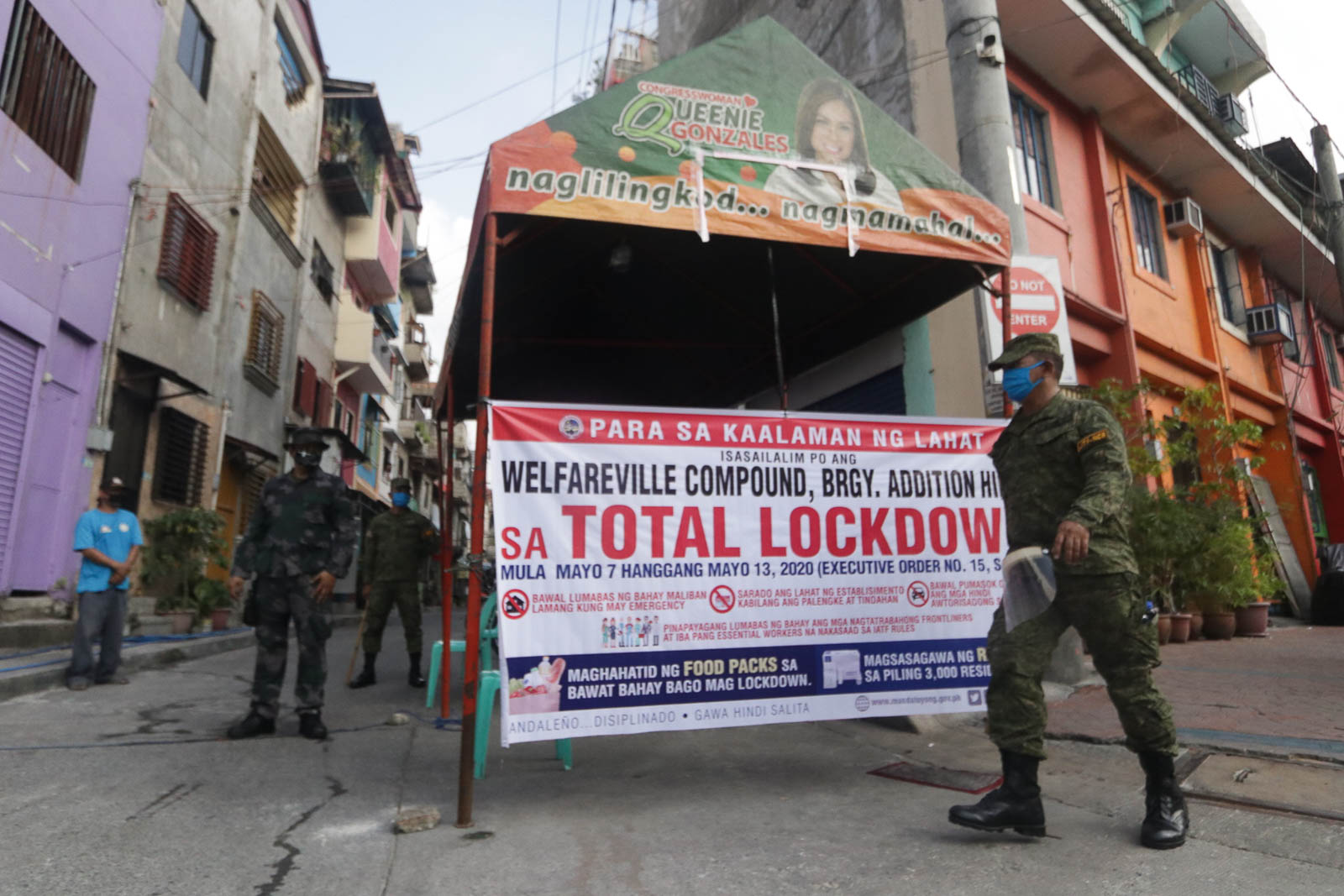
MANILA, Philippines (UPDATED) – The Philippine government has introduced a new form of quarantine to save economies of urban hubs with high numbers of coronavirus cases.
This is the "modified enhanced community quarantine" that will be enforced only in Metro Manila, Laguna, and Cebu City from May 16 to 31. (To know what form of quarantine your province or city is under, check here.)
This term was introduced by Presidential Spokesman Harry Roque in a press briefing on Tuesday, May 12.
He also introduced the term "modified general community quarantine" which will be observed in "low-risk" provinces and cities. Despite the label, it doesn't entail any strict stay-at-home measures. But it does require the continuance of health guidelines like mask-wearing, physical distancing, and frequent handwashing.
Here's what we know so far about these terms.
Who can go out?
- Modified ECQ: Strict stay-at-home measures but people will be allowed to leave their homes only to obtain essential goods and go to work in industries allowed to resume by the government.
Exercising outdoors, like jogging and biking, are now allowed if people wear masks and stay two meters apart.
- GCQ: People will be allowed to move around for work and essential services in barangays without coronavirus cases.
- Modified GCQ: Movement goes back to normal but mask-wearing, physical distancing, and other health protocols will be enforced.
What kind of industries can operate?
- Modified ECQ: Essential industries like health care, pharmacies, veterinary clinics, food manufacturing and supply chains, and groceries can operate at full capacity. But there will be an addition to these allowed industries – certain manufacturing and processing plants, which can operate at only 50% capacity. More commercial establishments can also operate at 50% capacity.
The full list is below, in the May 13 presentation of Roque:
https://www.scribd.com/embeds/461198562/content?start_page=1&view_mode=scroll&access_key=key-OVBQ0aUfspI73DrGFcKN " data-auto-height="true" data-aspect-ratio="1. 4455128205128205" scrolling="no" width="100%" height="600" frameborder="0">
- GCQ: More industries and establishments can operate at full capacity.
- Modified GCQ: All work resumes in private and public sector at full capacity but with enforcement of mask-wearing, physical distancing, and other health protocols.
How about transportation?
- Modified ECQ: Transportation, like private shuttles, will be allowed but only for essential work and services. There will still be no public transportation like trains, buses, jeeps, taxis, or transport network vehicle services (like Grab). Private cars are allowed, as long as only two people sit per row. Motorcycles, bicycles, and e-scooters allowed with only one rider.
- GCQ: Public transportation now allowed but with enforcement of health protocols. Private vehicles, motorcycles, bicycles, allowed.
- Modified GCQ: Same as GCQ.
How about flights?
- Modified ECQ: No domestic flights, no inter-island travel, limited international flights, Filipinos from abroad will be allowed to fly home.
- GCQ: Inter-island travel is allowed between two GCQ areas, with safety protocols enforced.
- Modified GCQ: All flights resume but with health protocols enforced.
How about government offices?
- Modified ECQ: Skeletal workforce in office premises while the rest work from home.
- GCQ: Alternative work arrangements like 4-day work week.
- Modified GCQ: Operations resume but with health protocols.
How about school?
- Modified ECQ: Physical classes can't resume yet.
- GCQ: School premises open to allow skeletal workforce to process requirements from students and prepare for next semester or graduation.
- Modified GCQ: Normal physical classes may resume with health protocols enforced.
How about gatherings?
- Modified ECQ: Only gatherings of up to 5 people are allowed, with health protocols observed.
- GCQ: Gatherings of up to 10 people are allowed, with health protocols observed.
- Modified GCQ: No information yet.
Zoning scheme under modified ECQ
The government also introduced a zoning scheme that will be implemented by local government chiefs in Metro Manila, Laguna, and Cebu City.
In this scheme, barangays with coronavirus cases will still be under the original ECQ. Those with 20 or more cases are considered "critical zones" and will be under ECQ or hard lockdowns.
Those with less cases are considered "containment zones" and will be under modified ECQ.
Barangays or clusters of barangays adjacent to any area with COVID-19 cases are "buffer zones" where GCQ will be enforced. Barangays outside a buffer zone will be on modified GCQ.
The task force left it up to provincial governors and mayors to decide on the zoning classification of their barangays. – Rappler.com







